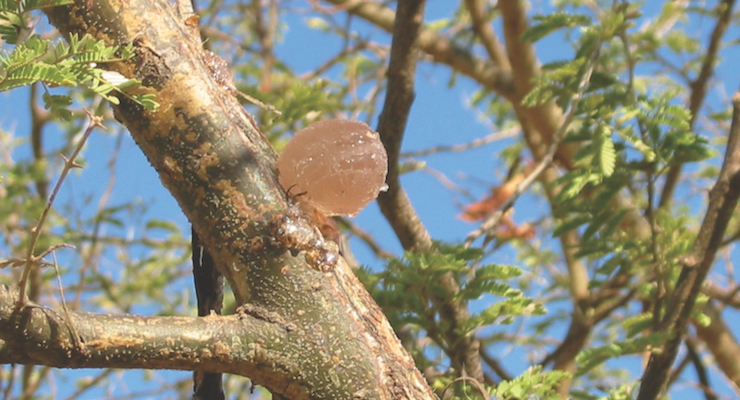12.20.21
The U.S. Food and Drug Administration (FDA) announced that it now recognizes acacia (gum Arabic) as a dietary fiber, in response to a citizen petition filed in January 2021 from Nexira, Alland & Robert, and Importers Service Corporation.
Based on the definition shown in the 2016 final rule on the Nutrition Facts label, the FDA concurred that based on available evidence, acacia can help reduce blood glucose and insulin levels after being eaten with a meal containing carbs known to raise blood glucose levels. This makes Acacia one of 18 types of non-digestible fibers which either meet FDA’s definition for dietary fiber as it relates to minimum daily intakes, or a type which FDA intends to recognize as a dietary fiber in the future.
For fibers which FDA hasn’t yet added to the definition of dietary fiber, “the agency intends to exercise enforcement discretion for manufacturers to include the amount of these additional fibers in the dietary fiber declaration on the Nutrition and Supplement Facts labels,” the agency said in the announcement. “Firms can submit citizen petitions at any time requesting that additional fibers be added to the definition of dietary fiber. Those petitions will be reviewed on a rolling basis.”
Nexira, an ingredient supplier at the forefront of discussion this case, shared its take on the positive outcome for those in the acacia field.
“Considering the strong scientific evidence on acacia fiber we were confident, but we are satisfied with the FDA decision to add acacia fiber to the approved list of dietary fibers,” Olivier Bove, regulatory affairs manager for Nexira, said. “Nexira is extremely proud to have to have led this important campaign and immensely pleased with the results.”
The supplier of Inavea and Fibregum, both acacia ingredients, said that the FDA ruling fully allows companies to actively position their products as a source of dietary fiber, as the agency will use enforcement discretion until final rulemaking is reached.
“Acacia fiber is easy to use in a large array of nutritional applications and we are convinced it has a huge potential for food and drink developers who want to formulate healthy, natural, and organic products. As the first carbon neutral brand of ingredients, Inavea now carries additional claims, to satisfy the demands of manufacturers and end consumers,” Mathieu Dondain, managing director of Nexira, said. “Nexira would like to thank all of its customers for their patience and for believing in our acacia fiber and its multiple benefits. We extended our capacity in prevision of this promising outcome and are hoping to soon manufacture acacia products in the U.S.A.”
Based on the definition shown in the 2016 final rule on the Nutrition Facts label, the FDA concurred that based on available evidence, acacia can help reduce blood glucose and insulin levels after being eaten with a meal containing carbs known to raise blood glucose levels. This makes Acacia one of 18 types of non-digestible fibers which either meet FDA’s definition for dietary fiber as it relates to minimum daily intakes, or a type which FDA intends to recognize as a dietary fiber in the future.
For fibers which FDA hasn’t yet added to the definition of dietary fiber, “the agency intends to exercise enforcement discretion for manufacturers to include the amount of these additional fibers in the dietary fiber declaration on the Nutrition and Supplement Facts labels,” the agency said in the announcement. “Firms can submit citizen petitions at any time requesting that additional fibers be added to the definition of dietary fiber. Those petitions will be reviewed on a rolling basis.”
Nexira, an ingredient supplier at the forefront of discussion this case, shared its take on the positive outcome for those in the acacia field.
“Considering the strong scientific evidence on acacia fiber we were confident, but we are satisfied with the FDA decision to add acacia fiber to the approved list of dietary fibers,” Olivier Bove, regulatory affairs manager for Nexira, said. “Nexira is extremely proud to have to have led this important campaign and immensely pleased with the results.”
The supplier of Inavea and Fibregum, both acacia ingredients, said that the FDA ruling fully allows companies to actively position their products as a source of dietary fiber, as the agency will use enforcement discretion until final rulemaking is reached.
“Acacia fiber is easy to use in a large array of nutritional applications and we are convinced it has a huge potential for food and drink developers who want to formulate healthy, natural, and organic products. As the first carbon neutral brand of ingredients, Inavea now carries additional claims, to satisfy the demands of manufacturers and end consumers,” Mathieu Dondain, managing director of Nexira, said. “Nexira would like to thank all of its customers for their patience and for believing in our acacia fiber and its multiple benefits. We extended our capacity in prevision of this promising outcome and are hoping to soon manufacture acacia products in the U.S.A.”




























